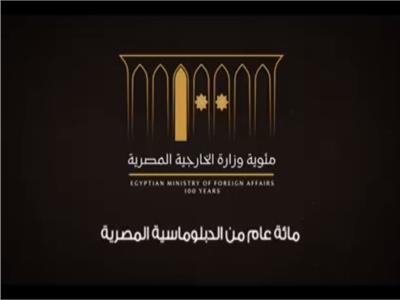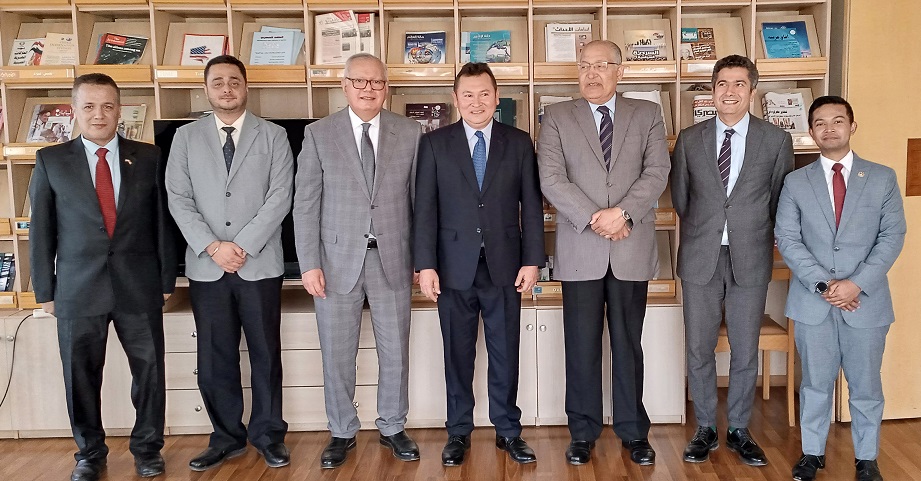Participation of Ambassador Dr. Mounir Zahran in the centenary conference of the Ministry of Foreign Affairs
May 31, 2022Seminar of Ambassador Ashraf Rashed on “The Egyptian Role in the Framework of the Governance Mechanism in the African Continent”
June 5, 2022
On June 1, 2022, Ambassador Dr. Ezzat Saad, ECFA Director, received (23) Arab trainees (mostly from Yemen and some from Saudi Arabia, Bahrain and Oman), along with Mr. Ahmed Abdel Moneim Eleiba, researcher at Al-Ahram Center for Political and Strategic Studies. The visit came at the Center’s request, within the framework of continuous cooperation between ECFA and Egyptian think tanks, to explain some political analysis skills and current developments in the global order, as well as Egypt’s foreign policy trends during the last eight years. In this regard, Ambassador Saad indicated that what President Abdel Fattah El-Sisi stresses, in connection with Egyptian foreign policy, is the intrinsic link between the internal stability of the state and the stability of the region in which it is located. The way to achieve a sustainable and secure peace in a region such as the Middle East does not lie in imported foreign solutions or associations with the global economy, or even the establishment of a system of regional collective security, as proposed by the major powers from time to time. In this context, the impressive successes achieved by the Egyptian foreign policy in a number of directions would not have been possible without a series of internal procedures and measures aimed at creating the necessary elements to enhance the country’s economic situation, especially with regard to infrastructure, energy, transportation, and benefiting from Egypt’s geographical location and the Suez Canal.
The main features of foreign policy during the era of President Abdel Fattah El-Sisi are: equality, mutual respect, non-interference in internal affairs, partnership and independent national decision, preserving the nation-state and respecting its sovereignty as the cornerstone of building the regional and international systems. Egyptian diplomacy is also characterized by deliberation, strategic restraint, avoidance of confrontation, careful reading of Egyptian priorities and interests, and recognition of the interests of other partners. This is clearly learned, for example, from the Egyptian approach of the Ethiopian Dam crisis and the Libyan crisis. In addition, priority always remains for the economic dimension and internal recovery as a necessary requirement for maintaining national security, of which foreign policy represents one of the important dimensions. This, of course, is in addition to the advanced rank that Cairo attaches to its Arab and African milieus by virtue of history and identity. Over the past eight years, Egypt’s relations with African countries have witnessed a significant boom in various fields, especially economic, trade, technical cooperation, the health sector, epidemic control, and the implementation of medical projects such as the establishment of hospitals and health centers, and others in the field of irrigation, water resources, and many others.
On September 8 and 9, 2021, the Ministry of International Cooperation launched the first edition of the Egypt International Cooperation Forum “EGYPT- ICF” – under the slogan “Partnerships for Development and Sustainable Development Financing” – with high-level international and regional participation, under the auspices of President El-Sisi. The Egyptian Prime Minister also recently announced that Egypt will host an expanded international summit on “infrastructure and sustainability” in 2022, with the aim of “discussing issues of comprehensive urban development and the quality of sustainable infrastructure in the African continent and the Arab region, and strengthening investment relations with brothers in African and Arab countries.”
In a related context, Ambassador Saad briefly discussed the new Egyptian foreign policy trends, in particular: the Egypt-Greece-Cyprus tripartite cooperation mechanism; The Egyptian orientation towards the Arab Mashreq; The new orientation towards the Red Sea region and the Horn of Africa; Egypt’s efforts to host refugees and asylum seekers on its territories; and reformulating the Egyptian role in the Middle East peace process.






